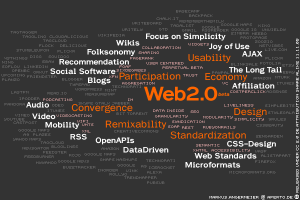14.90 € |
At Meetings, It’s BlackBerry vs. Manners
By ALEX WILLIAMS
As Web-enabled smartphones have become standard, the etiquette of using them during meetings is up for debate.
14.90 € |
 (sindachessa? Boh!) del mio paese, L.S.
(sindachessa? Boh!) del mio paese, L.S.GENTILE SIG M., NON RIESCO AD APRIRE LA SUA MAIL. SE GENTILMENTE PUò CONTATTARE TELEFONICAMENTE LA SIG.RA L. AL 91xxxxx E LASCIARE UN APPUNTO SU QUELLO CHE HA DA COMINICARMI O PRENDERE UN APPUNTAMENTO GLIENE SAREI GRATA. CORDIALI SALUTI, L.
Di seguito a questo "disperato" appello comparivano, ovviamente, le mie due mail precedenti, riportate, come tutti i normali programmi di posta elettronica fanno, una dopo l'altra.
Quindi non si capisce cosa voglia dire "non riesco ad aprire la sua mail"....
Ah, ma forse si tratta dell'allegato... Eh già, perché da perfetto "sovversivo" avevo pensato bene di confondere le acque, quando scrissi la prima mail di segnaazione, allegandovi due o tre foto della situazione che descrivevo.
Ma non le ho allegate e basta - no! Malvagio e pervertito come sono, le ho zippate in un unico file, per risparmiare banda e tempo.... E questo deve aver mandato in tilt tutti i sistemi nformatici del nostro comune, ivi comprese le connessioni sinaptiche degli operatori.
Talmente imprevedibile e spiazzante, il mio gesto diabolico, da costringere il sindaco (sindachessa?) a chiedermi di contattare una sua collaboratrice per lasciarle "un appunto su quello che ho da comunicarle"...
Eeeh già, quando si dice la solidità dei rapporti umani, magari suggellati da un buon colpo di telefono oppure da un sano pezzo di carta - altro che storie!!
Sentite, a questo punto io sono stanco, è tardi e voglio andare a dormire - non mi va di dilungarmi ed infierire oltre, ma un solo grido prorompe da dentro:
"BEPPE GRILLO, DOVE SEI ???!!!"
P.S.: il sindaco (sindachessa?) L. è di una giunta di sinistra, che io, *ovviamente*, HO VOTATO.... Tafazzi, bottiglia, please! 
|
|
|
|

May 5, 2009, 12:37 am
By Robert Mackey The first known instance of the symbol @ being used in writing: a 1536 letter from an Italian merchant. From our colleagues over at The Lede, The New York Times’s news blog:
|

My colleague Stefano F. pointed me to an interesting article on Wired about the 7 US way to fix the grid, where, among the other things, the author Brendan Koerner says that:
“[…]consider what we will ask the grid to handle in the near future: Demand for electricity is expected to increase by as much as 40 percent in the next two decades—more than twice the population growth rate. To meet that need, we will have to generate an additional 214 gigawatts, a feat that would require the construction of more than 357 large coal plants. We also want to plug in dozens, if not hundreds, of gigawatts of wind and solar power harvested from the most remote corners of the country. And we will want to recharge millions of electric vehicles every night, without fail.
That is why we must fix the grid—reinvent it to be reliable, efficient, responsive, and smart.“
Just a few hours after, I was fed with an article by Alan Boyle on msnbc.con about how smart the grid can be, that, even not being right the flipside of the coin, nonetheless highlights some issues one might not have already considered:
“[…] upgrading the grid doesn't come cheap: The total price tag, spread out over years or even decades, has been set at figures ranging from $200 billion to more than $800 billion.
In light of those numbers, the nearly $4 billion in stimulus money offered last week by the Energy Department for smart-grid projects might look like a pittance. But it's enough to get the attention of power-industry heavyweights.”
In the same Boyle’s post we can find a link to another article on msnbc.com about smart power meters tracking electricity use , where some “caveats” are reminded:
“Some rates, called "real time," change throughout the day as the wholesale price floats up and down. People who sign up for such plans may receive signals, such as e-mails or cell phone messages, to tell them prices are climbing dangerously.
So far, pilot programs have found that the average customer usually saves money. Critics note, however, that's not always the case”
|
|
 The new Ext4 filesystem seems to be on the verge of substituting the incumbent Ext3.
The new Ext4 filesystem seems to be on the verge of substituting the incumbent Ext3.
 Ho appena finito di ascoltare la conduttrice del TG1 che, con l'occhietto umido, proclamava il suo amore per colei che se è andata... Puah!
Ho appena finito di ascoltare la conduttrice del TG1 che, con l'occhietto umido, proclamava il suo amore per colei che se è andata... Puah!
|
|
|
|